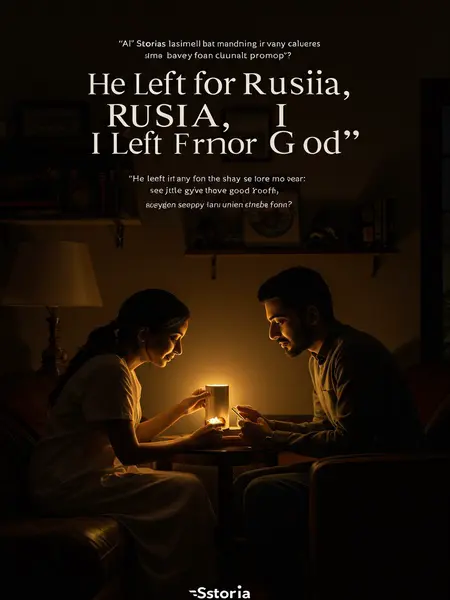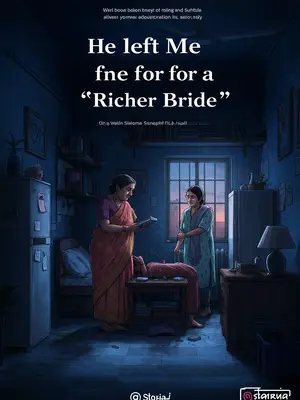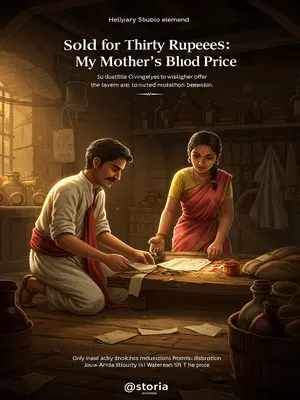Chapter 2: Six Days, No Words
I discovered the visa in the car. I always keep cash in envelopes, just in case.
That Thursday felt like any other. The car was stifling from the afternoon heat. As I reached under the seat for the envelope, the smell of stale air freshener and last week’s samosa wrappers stung my nose. My fingers went numb, the visa slipping from my hand and fluttering onto the dusty car mat. For a second, I just stared at it, not trusting my own eyes.
The blue-and-white paper glared up at me in the harsh sunlight, official stamps crisp and clear. For a moment, I thought it was an old passport copy, until I saw—"Visa—Russian Federation." My breath hitched. I sat there sweating, the engine running, the outside world fading away.
Russia. Of all places. My mind spun—Russia, where even the news channels blare war and sanctions. Just last night, my mother-in-law had muttered, "Arrey, who goes to Russia these days? Koi akal hai?" I’d thought she meant some distant cousin. Never imagined...
Everyone knows Russia is at war—going now is like tempting fate.
The idea of my husband—who fusses over his blood pressure and avoids even green chilli—heading into a conflict zone was absurd. News flashes of bombings and soldiers danced before my eyes. As my father would say, "Wahan toh hawa bhi khatarnaak hai."
There were more papers in the envelope. I pulled them out—a job offer letter and ID documents.
The sheets were as thin as hospital bills. One page bore the company logo, another listed salary figures. My hands shook as I read the fine print, heart pounding in my ears.
Every page had "Rohan Malhotra" in his careful signature—the same as on our marriage certificate, flat agreement, children’s school forms. His name seemed stamped across my whole life, as if my fate was tied to it.
Rohan is my husband. Twelve years married, a six-year-old son, a three-year-old daughter.
We met in college—"just another love story," people said. Now, two kids, two home loans, and a life running like clockwork: school bags, doctor appointments, Sunday biryani. I thought I knew him inside out.
The offer letter was blunt: starting next month, Mr. Rohan Malhotra would be chief engineer at the Russian office for five years.
The words blurred. Five years—not one or two. Longer than our car loan. The letter mentioned housing allowance, yearly return flight, as if those could balance what he was dumping on me.
It was already the twenty-fourth. At the latest, he’d be on a plane by month-end.
Six days. Six days, and not a word. Not even a stray mention over chai, not a late-night confession on our balcony. The betrayal sat in my chest, heavy as a sack of wet rice.
And all this—as his wife—I knew nothing.
I stared out the window, watching crows peck at old poha. How many times had I told friends, "Rohan shares everything with me." The irony stung.
When I flung the visa at Rohan, his face turned the colour of raw dough.
He sat at the dining table, scrolling his phone, half-eaten banana on the plate. When the papers hit the glass, his head snapped up. His mouth opened, but no words came. For a moment, he looked like a boy caught stealing sweets during Diwali.
He rushed to Anya, playing with her blocks. "Anya, come here, Papa will play with you. That’s not how you build it."
He scooped her up, voice suddenly cheery—his old trick: hiding behind the children, hoping the moment would dissolve. Anya giggled, unaware. My heart hardened. I realised he’d rather use his children as a shield than face me.
He knows me too well. He knows I don't want to argue in front of the children or the elders. I smoothed Anya’s hair, forcing a smile, while my insides churned. In our house, even anger had to wear a polite face.
For the next few days, I couldn’t get him alone.
He buried himself in bedtime stories, homework checks, listening to his father talk about LIC policies. Every time I entered a room, he slipped out with some excuse. It was like chasing a shadow.
He was always busy—feeding Anya, helping Aarav, chatting with his parents.
The walls felt tight. Even the maid whispered to the neighbours, "Madam seems tense these days." I caught my reflection in the fridge—dark circles, clenched jaw. Patience running out, minute by minute.
It wasn’t until the night before his flight that he left the kids with his parents and finally sat at the edge of my bed, silent, staring at me.
The house was silent except for the fan’s squeak. He perched there, back straight, hands folded like a schoolboy awaiting punishment. I waited, refusing to break the silence. The old clock in the hall struck eleven.
We started dating at twenty, married at twenty-three, fifteen years together. For the first time, I saw how selfish he could be.
I remembered the way he’d bring me tea on winter mornings, how he’d hold my hand in the market, and how he’d once stayed up all night when I had a fever. That Rohan felt like a memory from someone else’s life.
The first thing he said was, "I was afraid you’d try to stop me. I can’t give up this opportunity."
He looked away, words tumbling out like lines from a rehearsed play. For the first time, I saw fear—not of losing me, but of missing his big break.
"So what am I supposed to do? Am I just supposed to take care of both kids by myself, and look after your parents too?"
My voice trembled, but I forced myself to sound strong. Enough of being the understanding wife.
"Just hang in there, Meera. Do it for me, for the kids. After I come back, everything will be different. At the very least, I'll be promoted to deputy general manager. I'll have fifteen days of vacation a year and I promise I'll come back to see all of you. As for salary, I'll be paid by both the Indian and the overseas company."
He leaned forward, as if offering me a deal I couldn’t refuse. "Fifteen days, Meera. I’ll be here for Diwali, for their birthdays, for anything important. This is the only way, yaar."













